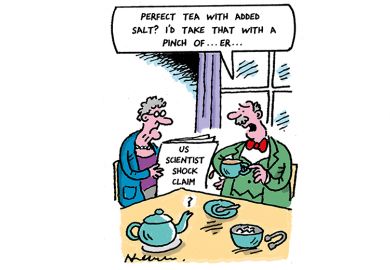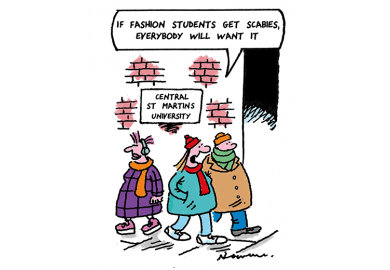
The former Tory Cabinet minister Rory Stewart pivoted to podcasting after his departure from politics, teaming up with erstwhile Labour spin doctor Alastair Campbell on The Rest Is Politics. But he could have a new role on the horizon: bookies have named him the front runner to become the next chancellor of the University of Oxford, The Daily Telegraph reported, after Lord Patten of Barnes announced that he would retire at the end of the academic year. Mr Stewart, who was recently announced as professor in the practice of grand strategy at Yale University, said of the speculation: “This is a very interesting idea and an amazing role, but I would have to think hard about whether I am the right candidate.” Also mooted as a successor to Lord Patten? Former prime minister Theresa May, who was also Mr Stewart’s boss – suggesting that experience on the Conservative benches is considered a key prerequisite for the role.
For most, a freezer malfunctioning shortly before Christmas might mean a last-minute dash to buy a turkey, or a round of snowballs imbibed at room temperature. For the Karolinska Institute, however, it meant the loss of decades of research believed to be worth millions, The Guardian reported. The Swedish university announced this month that the supply of liquid nitrogen to 16 cryogenic tanks was interrupted at some point between 22 and 23 December. This deprived the tanks of extra liquid nitrogen for five days and resulted in the destruction of the samples within. “These are samples that have been the subject of extensive studies, and there were plans for more studies,” said Matti Sällberg, dean of the institute’s southern campus. While police have been alerted “to cover all bases”, he continued, there was “no indication” at present that the tanks were deliberately sabotaged.
When the BBC first invited the philosophy professor Angie Hobbs to appear on Radio 4’s In Our Time, she came close to turning it down, recalling that she was so nervous before broadcast that a researcher followed her to the toilet “in case [she] did a runner”. Ultimately, the University of Sheffield academic didn’t make a break for it, and has gone on to become the programme’s most frequent contributor, with 25 appearances, according to a tally by The Times. “It’s one of the few programmes that a lot of academics listen to,” she explained. “It can add a bit of gloss to your career.” For comparison, Dame Mary Beard, perhaps the UK’s most famous classicist, has racked up a measly nine appearances. Professor Hobbs even sneaked in secret messages for her daughter, Molly, although presenter Lord Bragg rumbled her one episode when the code word was “Sicily”. “After that, Melvyn would ask me: what code word are you trying to get in this time?” she said.
Why go travelling, or saving up money for your degree study, when you could instead spend some of your gap year in a military boot camp? General Sir Patrick Sanders, the British Army’s chief of the general staff, floated the idea at a recent Ministry of Defence brainstorming session, The Times reported. Participants would take part in a “month-long summer course on what it is like to be in the army”, which, the general reportedly hopes, would encourage them to subsequently join the reserves. The suggestion came after General Sanders said the UK should establish a “citizen army” to ensure that the country is prepared for the possibility of war. While a dose of military discipline might do freshers some good, we’re not expecting queues at recruitment offices just yet.
Fruit flies, according to researchers at Durham University, are more than just a menace to the fruit bowl: they have offered “new insight into the genetic basis for rapid evolution of male external genitalia driven by sexual selection”, the university said. Its bioscientists studied the male genitalia of two closely related fruit fly species, identifying one of the genes that impacts their development. The team discovered that “evolved higher levels of the gene Sox21b repressed the size of the genital lobes in Drosophila mauritiana, giving them smaller genital lobes than Drosophila simulans”. Because these lobes allow male fruit flies to hold on to their sexual partners, the discovery “could now help to better understand the effect sexual selection has on the genome to drive changes in genitalia shape and size”. Whoever said size doesn’t matter?
Register to continue
Why register?
- Registration is free and only takes a moment
- Once registered, you can read 3 articles a month
- Sign up for our newsletter
Subscribe
Or subscribe for unlimited access to:
- Unlimited access to news, views, insights & reviews
- Digital editions
- Digital access to THE’s university and college rankings analysis
Already registered or a current subscriber?



